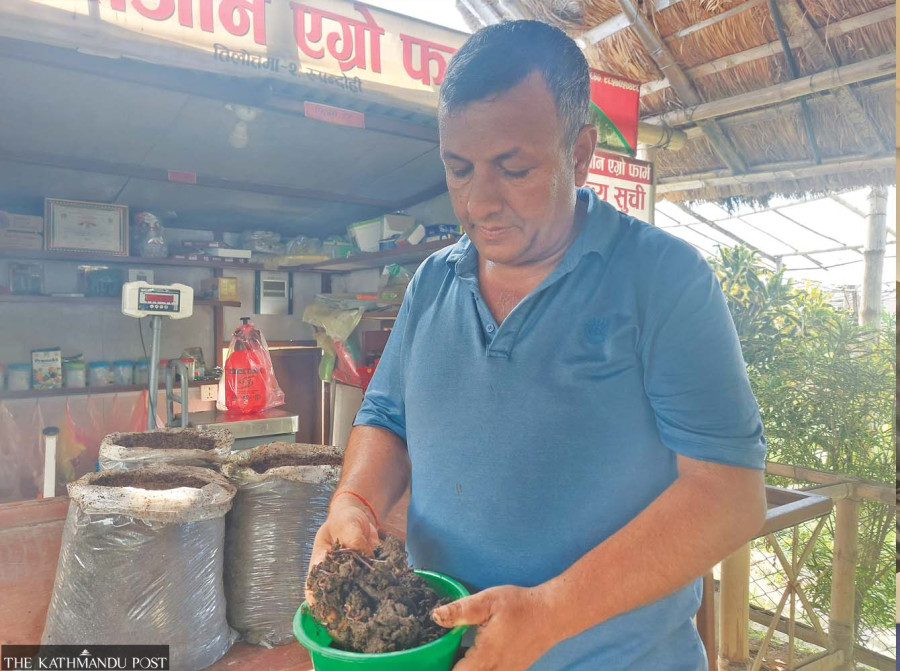Money
Earthworm production raises farm income
Earthworm manure has become the first choice among those doing terrace or roof farming.
Sanju Paudel
Ishwori Bhandari has to jump out of bed early in the morning everyday because the phone never stops ringing.
The 50-year-old returnee migrant from Tilottama-2, Rupandehi raises earthworms and produces organic manure, and has a devoted fan following among farmers across Nepal.
The vermicompost which he makes using earthworms is an excellent fertiliser, while fish hatcheries, pet stores and poultry farmers buy the wriggly creatures to use as feed.
Bhandari spent several years in the Gulf and India as a migrant worker before returning to start something of his own.
In 2013, he went into the marketing business but wasn't successful. He struggled for nearly seven years after that.
In 2020, he decided to enter the agricultural sector. "I invested Rs2 million to start a farm on two and a half bighas,” said Bhandari.
He started Green Zone Agro Farm and operated a nursery. “At the same time, I was doing research on the internet about producing organic manure using earthworms. After I thought I had learned enough, I began raising them.”
Bhandari also travelled to Chitwan to observe earthworm farming. Nowadays, he supplies organic manure and earthworms across the country. He produces earthworms in 15 plastic tunnels. He also makes vegetable seeds and maintains a large marigold farm.
"I sell earthworms for Rs1,000 per kg and organic manure for Rs35 per kg. There is huge market potential for earthworms and manure produced from them,” Bhandari said.
According to him, it costs Rs125,000 to build a sophisticated tunnel or greenhouse. "I have spent Rs3 million on my farm so far. I am trying to raise capital to expand my farm."
Bhandari collects cow and buffalo dung and weeds to rear earthworms.
Home and commercial vermicomposters buy earthworms. Studies have shown that vermicompost enhances plant growth, suppresses diseases and insects in plants, and increases microbial activity in the soil.
Vermicompost also improves water retention, aeration and porosity in soils.
According to Bhandari, earthworms lay eggs from mid-October to mid-March in harvesting beds or bins. “In a season, 1 to 5 kilos of earthworms are born in 15 beds.”
Water should be applied three times a day to maintain the temperature and moisture. It is important to spread water by checking the condition and whether the earthworms have completely entered the soil.
Unless the earthworms eat cow dung, they cannot produce manure. Bhandari says he obtained 20 tractor-loads of cow dung for 15 tunnels.
"In the beginning, I learned to produce manure by using earthworms for my nursery. Later, orders for earthworms started pouring in,” Bhandari said.
Earthworm manure has become the first choice among those doing terrace or roof farming, locally known as kausi farm. Vermicompost is in high demand for kausi farming.
Bhandari says he sells 25 trolleys of manure and 200 kg of earthworms annually. He has an annual income of Rs800,000.
"Earthworm manure does not make the hands stink and it contains micronutrients like nitrogen, phosphorus and sulphur which help the growth of plants and fruiting," Bhandari said.
Earthworm manure becomes ready for delivery in 75 days and is sold in packages.
"All customers who come to buy plants from my nursery also buy the manure," Bhandari said. “Not only that, people are coming to study earthworm farming.”
Agriculture students, researchers and farmers are frequent visitors to his farm. Bhandari says demand for his manure has grown, but he has not been able to fulfil all the orders he get.
"I am receiving tonnes of orders. Nowadays, I get orders from Rolpa too,” he said. "Demand for earthworms is huge, but I am not able to supply a fraction of it."
Domlal Bhusal, chief of the agriculture branch of Tilottama Municipality, said that the municipality initially supported Bhandari with a cash subsidy of Rs20,000.
“When Bhusal first invited us to visit his farm, we did not pay much attention. We later visited his farm and we were totally surprised.”
Bhusal says the municipality has prioritised farmers who are engaged in organic farming.
Chemical fertilisers play an important role in promoting farm production and income and ensuring national food security. However, overuse of chemical fertilisers has resulted in serious agricultural non-point source pollution.
Excessive use of chemical fertilisers in agricultural fields mainly leads to the degradation of soil quality.
Haphazard use of chemical fertilisers has rampantly eroded soil fertility in Nepal, hitting agricultural productivity, mostly in the Tarai region, the country’s food basket.
In 2018, the Eastern Region Soil Test Laboratory collected 600 samples of soil from 16 districts of the eastern region, including Jhapa, Morang, Sunsari, Siraha and Saptari. Of these samples, 70 percent contained acidic properties, which are harmful to the soil.
The acidity level in the soil in the Tarai has risen to an alarming level as many farmers have stopped using compost and are relying more and more on chemical fertilisers, experts say.
Chemical fertiliser imports surged after 2009 when more and more farmers adopted commercial farming, particularly vegetable farmers.
The government reinstated subsidies on chemical fertilisers in 2009 to boost agricultural production and ensure food security. Acting on the conditions laid down by donors, the government had started deregulating the fertiliser trade in 1997 with subsidies on DAP and potash being completely removed.
Since 2009, the government has been providing a 40-45 percent subsidy on fertilisers.
In the last fiscal year, Nepal imported a record-high amount of chemical fertilisers worth Rs40 billion, a sharp rise from Rs10 billion in 2019. The high figure is mainly attributed to the rise in prices of fertilisers in the global market.
Experts say fertilisers should be applied in sufficient quantities and in balanced proportions—or there should be balanced use of chemical and organic fertilisers to keep the soil health intact.
Agricultural expert Tej Narayan Gaire says vermicompost is very effective for agriculture sustainability. "Nepal must take into account the potential of cultivating earthworms and encourage such farmers," he said.




 9.33°C Kathmandu
9.33°C Kathmandu














